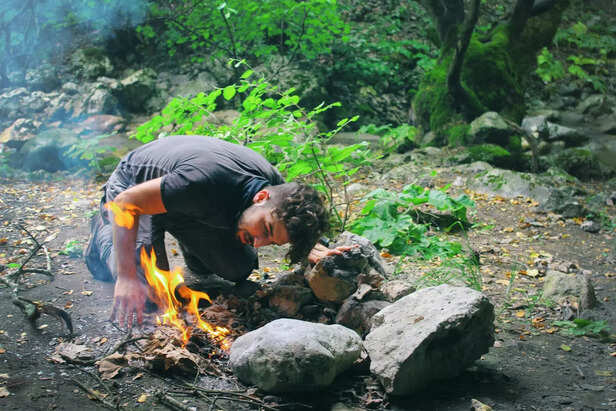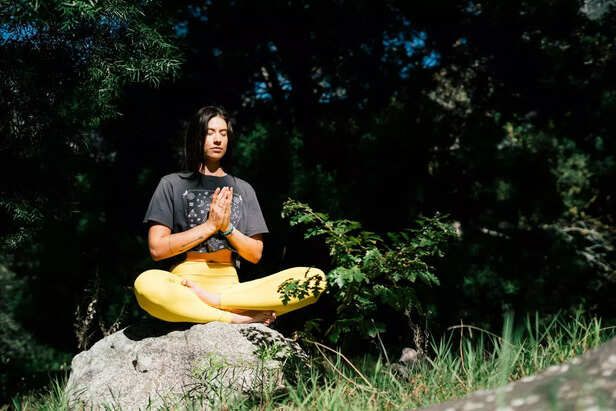Moksha Isn’t Death, It’s Living Without Fear - The Gita Says Return to Yourself
Riya Kumari | Jun 12, 2025, 13:24 IST
( Image credit : Freepik, Timeslife )
You know that scene in every romcom where the main character (usually in a coffee shop, slightly sleep-deprived, wearing the world’s most iconic messy bun) has an epiphany about life? Well, this is kind of like that—except instead of realizing “he was The One all along,” you realize you don’t actually need anything to be whole. Wild, right?
There comes a point where nothing on the outside is enough. Not people. Not success. Not distractions. You look around and everything feels louder than it should, emptier than it used to. You go to work, you say the right things, you keep up. But inside, there’s a quiet ache that keeps asking: Is this all there is?
And maybe you tell yourself to stay strong. To be grateful. To push through. But strength without purpose turns into numbness. And gratitude without truth turns into guilt. You're not weak for feeling lost. You're human. The Gita doesn’t shame you for that. It meets you there.

Most of us are taught to chase stability, approval, safety. We’re taught that a good life is one where nothing falls apart. But the truth is: even the best lives break sometimes. People leave. Plans fail. Identities crack. And when that happens, no amount of “positive thinking” can save you. That’s when the Gita steps in—not with pretty words, but with truth that holds.
It doesn’t ask you to rise. It asks you to wake up. To remember who you were before fear taught you to shrink. Before you made yourself small to fit into people’s expectations. Before you measured your worth by how well you kept it together.

You were never meant to carry this much weight. To make everyone proud while abandoning your own soul. You were never meant to be perfect. Only present. Only real. And yet, we’ve all learned to perform—smile through the pain, succeed through the emptiness, apologize for wanting peace. But the Gita says: You are not here to be liked. You are here to be free.
Free from the fear of judgment. Free from the shame of not being enough. Free from the lie that your value depends on outcomes. Moksha is that moment when you realize: You don’t need to control everything to find peace. You just need to stop abandoning yourself.

Krishna never told Arjuna to suppress his fear. He didn’t ask him to pretend to be brave. He reminded him of his truth—the part of him that existed before the noise, the doubt, the pressure. That’s moksha. Not some distant heaven. Not some ritual reward.
But the quiet clarity that says: I can face this. Because I am not this pain. I am not this failure. I am not this fear. When everything outside breaks, moksha is the ground inside that doesn’t.

Maybe no one ever told you this. Maybe they only taught you how to survive. But the Gita does not speak to your image. It speaks to your essence. It doesn’t ask if you’re successful. It asks if you’re awake. If you’re living in truth. If you remember that you are more than what the world sees.
And if you don’t remember yet, that’s okay. That’s why this path exists. To help you come home. To give your pain a place to rest. To remind you that liberation isn’t about leaving behind your life—it’s about returning to it, without fear.
Not when everything is fixed. But when you stop needing to be fixed. Not when you win. But when you stop letting your worth hang on winning. It’s the moment you sit with your broken pieces and no longer feel ashamed. It’s when you stop trying to be seen—and start seeing yourself. It’s not loud. It’s not dramatic. It’s quiet, but undeniable: I’m still here. And I’m still enough.
So if you’re tired, if you’ve lost your way, if you don’t know how to keep going—Don’t rise. Just return. To the you that was never gone—just buried under fear. That’s moksha. And you’re closer than you think.
And maybe you tell yourself to stay strong. To be grateful. To push through. But strength without purpose turns into numbness. And gratitude without truth turns into guilt. You're not weak for feeling lost. You're human. The Gita doesn’t shame you for that. It meets you there.
The world teaches you to build a life. The Gita teaches you how to live

Survival
( Image credit : Pexels )
Most of us are taught to chase stability, approval, safety. We’re taught that a good life is one where nothing falls apart. But the truth is: even the best lives break sometimes. People leave. Plans fail. Identities crack. And when that happens, no amount of “positive thinking” can save you. That’s when the Gita steps in—not with pretty words, but with truth that holds.
It doesn’t ask you to rise. It asks you to wake up. To remember who you were before fear taught you to shrink. Before you made yourself small to fit into people’s expectations. Before you measured your worth by how well you kept it together.
Moksha isn’t about leaving the world. It’s about not losing yourself to it

Mirror
( Image credit : Pexels )
You were never meant to carry this much weight. To make everyone proud while abandoning your own soul. You were never meant to be perfect. Only present. Only real. And yet, we’ve all learned to perform—smile through the pain, succeed through the emptiness, apologize for wanting peace. But the Gita says: You are not here to be liked. You are here to be free.
Free from the fear of judgment. Free from the shame of not being enough. Free from the lie that your value depends on outcomes. Moksha is that moment when you realize: You don’t need to control everything to find peace. You just need to stop abandoning yourself.
The soul doesn’t need fixing. It needs remembering

Mindful
( Image credit : Pexels )
Krishna never told Arjuna to suppress his fear. He didn’t ask him to pretend to be brave. He reminded him of his truth—the part of him that existed before the noise, the doubt, the pressure. That’s moksha. Not some distant heaven. Not some ritual reward.
But the quiet clarity that says: I can face this. Because I am not this pain. I am not this failure. I am not this fear. When everything outside breaks, moksha is the ground inside that doesn’t.
You are not too late. You are not too broken. You are not beyond peace

Imperfection
( Image credit : Pexels )
Maybe no one ever told you this. Maybe they only taught you how to survive. But the Gita does not speak to your image. It speaks to your essence. It doesn’t ask if you’re successful. It asks if you’re awake. If you’re living in truth. If you remember that you are more than what the world sees.
And if you don’t remember yet, that’s okay. That’s why this path exists. To help you come home. To give your pain a place to rest. To remind you that liberation isn’t about leaving behind your life—it’s about returning to it, without fear.
Moksha is not the end. It is the moment you begin again—this time, fully yourself
Not when everything is fixed. But when you stop needing to be fixed. Not when you win. But when you stop letting your worth hang on winning. It’s the moment you sit with your broken pieces and no longer feel ashamed. It’s when you stop trying to be seen—and start seeing yourself. It’s not loud. It’s not dramatic. It’s quiet, but undeniable: I’m still here. And I’m still enough.
So if you’re tired, if you’ve lost your way, if you don’t know how to keep going—Don’t rise. Just return. To the you that was never gone—just buried under fear. That’s moksha. And you’re closer than you think.
